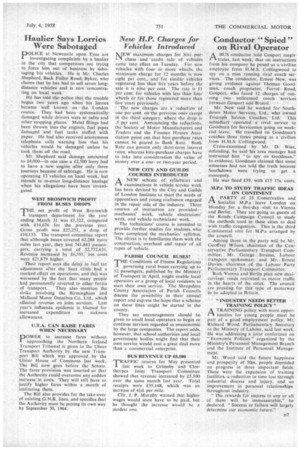Haulier Says Lorries Were Sabotaged
Page 53

If you've noticed an error in this article please click here to report it so we can fix it.
DOLICE at Newcastle upon Tyne are investigating complaints by a haulier in the city that competitors are trying to force him out of business by sabotaging his vehicles. He is Mr. Charles Shepherd, Back Fuller Road, Byker, who claims that he has had to sell seven longdistance vehicles and is now concentrating on local work. He has told the police that the trouble began two years ago when his lorries became well known on the London routes.. They had been systematically: damaged while drivers were at cafes and other stopping places. Metal filings had been thrown into the engines, fuel pipes damaged and fuel tanks stuffed with paper. I-k had also received anonymous telephone calls warning him that his vehicles would be damaged unless he took them off the road. Mr. Shepherd said damage amounted to £4,000—in one case a £2,500 lorry had to have a new engine after only three journeys because of sabotage. He is now operating 13 vehicles on local work, but intends to re-enter long-distance haulage when his allegations have been investigated.
WEST BROMWICH PROFIT FROM BUSES DROPS
THE net profit of West Bromwich transport department for the year ending March 31 was £1,322, compared with £14,676 for the previous year. Gross profit was £25,251, a drop of £10,153. The transport committee report that although buses covered 62,288 more miles last year, they lost 741,843 passen • gers, carrying. a total of 52.772,631. Revenue increased by £6,51., but costs were £21,679 higher.
Their report says the'delay in fuel tax' • adjustment after the Suez Crisis had a marked effect on operations, and this was worsened by the fact that many people had permanently reverted to other forms
of transport. They also mention the strike involving the Birmingham and Midland Motor Omnibus Co., Ltd., which affected revenue on joint services. Last year's influenza epidemic is blamed for increased expenditure on sickness allowances.
U.T.A. CAN RAISE FARES WHEN NECESSARY
DOWER to increase fares without I approaching the Northern Ireland Transport Tribunal is given to the Ulster Transport Authority by the new Transport Bill which was approved by the Ulster House of Commons last week.. The Bill now goes before the Senate. The fares provision was inserted so that the Authority could overcome any sudden .increase in costs. They will still have to justify higher fares within a month of instituting them. The Bill also provides for the take-over of existing G.N.R. lines, and specifies that the Authority must be paying its own way by September 30, 1964.




























































































































